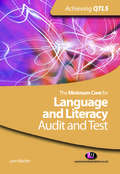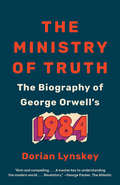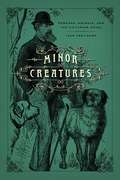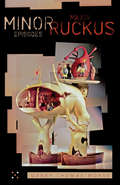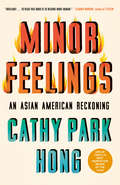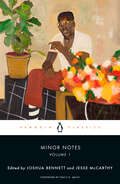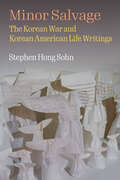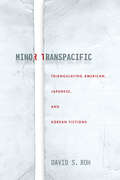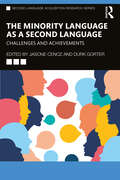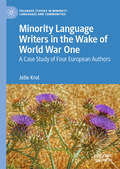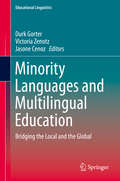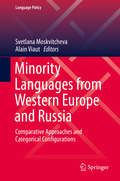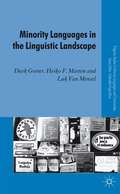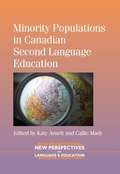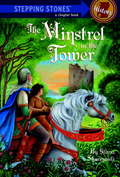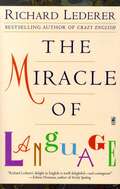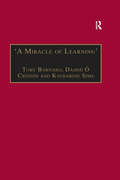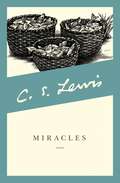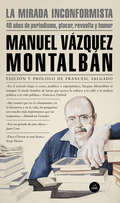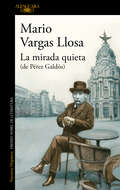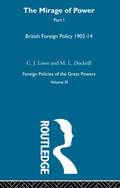- Table View
- List View
The Minimum Core for Language and Literacy: Audit And Test (Achieving QTLS Series)
by Lynn MachinThis book supports trainee teachers in the Lifelong Learning Sector in the assessment of their literacy knowledge. A self-audit section is included to help trainees understand their level of competence and confidence in literacy and will help them identify any gaps in their knowledge and skills. This is followed by exercises and activities to support and enhance learning. The book covers all the content of the LLUK standards for the minimum core for literacy. Coverage and assessment of the minimum core have to be embedded in all Certificate and Diploma courses leading to QTLS and ATLS status.
The Ministry of Truth: The Biography of George Orwell's 1984
by Dorian LynskeyAn authoritative, wide-ranging, and incredibly timely history of 1984--its literary sources, its composition by Orwell, its deep and lasting effect on the Cold War, and its vast influence throughout world culture at every level, from high to pop.1984 isn't just a novel; it's a key to understanding the modern world. George Orwell's final work is a treasure chest of ideas and memes--Big Brother, the Thought Police, Doublethink, Newspeak, 2+2=5--that gain potency with every year. Particularly in 2016, when the election of Donald Trump made it a bestseller ("Ministry of Alternative Facts," anyone?). Its influence has morphed endlessly into novels (The Handmaid's Tale), films (Brazil), television shows (V for Vendetta), rock albums (Diamond Dogs), commercials (Apple), even reality TV (Big Brother). The Ministry of Truth is the first book that fully examines the epochal and cultural event that is 1984 in all its aspects: its roots in the utopian and dystopian literature that preceded it; the personal experiences in wartime Great Britain that Orwell drew on as he struggled to finish his masterpiece in his dying days; and the political and cultural phenomena that the novel ignited at once upon publication and that far from subsiding, have only grown over the decades. It explains how fiction history informs fiction and how fiction explains history.
Minnesota McDougal Littell Literature [Grade 9]
by Janet Allen Arthur N. Applebee Jim BurkeNIMAC-sourced textbook
Minor Characters Have Their Day: Genre and the Contemporary Literary Marketplace (Literature Now)
by Jeremy RosenHow do genres develop? In what ways do they reflect changing political and cultural trends? What do they tell us about the motivations of publishers and readers? Combining close readings and formal analysis with a sociology of literary institutions and markets, Minor Characters Have Their Day offers a compelling new approach to genre study and contemporary fiction. Focusing on the booming genre of books that transform minor characters from canonical literary texts into the protagonists of new works, Jeremy Rosen makes broader claims about the state of contemporary fiction, the strategies of the publishing industry over recent decades, and the function of literary characters.Rosen traces the recent surge in "minor-character elaboration" to the late 1960s and works such as Jean Rhys's Wide Sargasso Sea and Tom Stoppard's Rosencrantz and Guildenstern Are Dead. These early examples often recover the voices of marginalized individuals and groups. As the genre has exploded between the 1980s and the present, with novels about Ahab's wife, Huck Finn's father, and Mr. Dalloway, it has begun to embody the neoliberal commitments of subjective experience, individual expression, and agency. Eventually, large-scale publishers capitalized on the genre as a way to appeal to educated audiences aware of the prestige of the classics and to draw in identity-based niche markets. Rosen's conclusion ties the understudied evolution of minor-character elaboration to the theory of literary character.
Minor Creatures: Persons, Animals, and the Victorian Novel (Animal Lives)
by Ivan KreilkampIn the nineteenth century, richly-drawn social fiction became one of England’s major cultural exports. At the same time, a surprising companion came to stand alongside the novel as a key embodiment of British identity: the domesticated pet. In works by authors from the Brontës to Eliot, from Dickens to Hardy, animals appeared as markers of domestic coziness and familial kindness. Yet for all their supposed significance, the animals in nineteenth-century fiction were never granted the same fullness of character or consciousness as their human masters: they remain secondary figures. Minor Creatures re-examines a slew of literary classics to show how Victorian notions of domesticity, sympathy, and individuality were shaped in response to the burgeoning pet class. The presence of beloved animals in the home led to a number of welfare-minded political movements, inspired in part by the Darwinian thought that began to sprout at the time. Nineteenth-century animals may not have been the heroes of their own lives but, as Kreilkamp shows, the history of domestic pets deeply influenced the history of the English novel.
Minor Episodes / Major Ruckus
by Garry Thomas MorseIn tribute to the surrealist narrative techniques of André Breton and Robert Desnos, Minor Episodes documents the serial adventures of Minor, the ubiquitous "everymogul" who embodies the economic one percent and keeps musically erotic quixotics on tap. Having entered a "rent in time" that gives each chapter an alternate reality, Minor swaggers through an undersea casino, in-flight blockbuster, bawdy Western, and Kafkaesque job hunt, cavorting with billboard queen Bébé Lala and country-music legend Faith Faith, when not dressing down his shifty sidekick, The Concierge, or haunting the intensely disinterested songstress Miss Sharp. However, danger looms in the form of The Stropper, a serial killer fresh out of a shaving promotion, and an enigmatic ginger-beer icon who has retired from a satisfying life of culinary assassinations.Major Ruckus, a contrapuntal text and parody of the speculative fiction genre, celebrates the stylistic techniques of William S. Burroughs and Robert Anton Wilson, following a frenzied struggle by various parties to obtain an essential time-travel component, a struggle that includes psychic "dicks," universal call-center operators, aboriginal eroticists, lubricant heiresses, rogue advertisement animations, pornography censors, and alien sperm-bank clones, all to the horrified fascination of hapless meta-writer Oober Mann. But ultimately it is Carl Sagan who creates the most confusion, when his prudish doodle of a woman is sent into space aboard the Voyager probe, triggering a plan to "assist" Earth's declining population through extraterrestrials in the guise of census takers.Minor Episodes and Major Ruckus introduce The Chaos! Quincunx series.Garry Thomas Morse is a Governor General's Award-nominated poet and fiction writer.
Minor Feelings: An Asian American Reckoning
by Cathy Park HongPoet and essayist Cathy Park Hong fearlessly and provocatively blends memoir, cultural criticism, and history to expose fresh truths about racialized consciousness in America. Part memoir and part cultural criticism, this collection is vulnerable, humorous, and provocative—and its relentless and riveting pursuit of vital questions around family and friendship, art and politics, identity and individuality, will change the way you think about our world. Binding these essays together is Hong’s theory of “minor feelings.” <P><P> As the daughter of Korean immigrants, Cathy Park Hong grew up steeped in shame, suspicion, and melancholy. She would later understand that these “minor feelings” occur when American optimism contradicts your own reality—when you believe the lies you’re told about your own racial identity. Minor feelings are not small, they’re dissonant—and in their tension Hong finds the key to the questions that haunt her. With sly humor and a poet’s searching mind, Hong uses her own story as a portal into a deeper examination of racial consciousness in America today. This intimate and devastating book traces her relationship to the English language, to shame and depression, to poetry and female friendship. A radically honest work of art, Minor Feelings forms a portrait of one Asian American psyche—and of a writer’s search to both uncover and speak the truth.
Minor Notes, Volume 1
by Joshua Bennett Jesse McCarthy Tracy K. SmithThe first volume in an anthology series that amplifies the voices of unsung Black poets to paint a more robust picture of our national past, and of the Black literary imagination, with a foreword by Tracy K. SmithA Penguin ClassicJoshua Bennett and Jesse McCarthy repeatedly found themselves struck by the number of exciting poets they came across in long-out-of-print collections and forgotten journals whose work has been neglected or entirely ignored, even by scholars of Black poetry. Minor Notes is an excavation initiative that recovers and curates archival materials from these understudied, though supremely gifted, African American poets of the nineteenth and twentieth centuries, and aims to bridge scholarly interest with the growing general audience who reads, writes, and circulates poetry within that tradition. As Minor Notes clarifies, the work of contemporary Black poets is perhaps best understood through the lens of a long-standing tradition of the poet as witness, as prophetic voice, as communal bard, and as scholar of the everyday and the miraculous. The poets featured in Volume 1 are George Moses Horton, Fenton Johnson, Georgia Douglas Johnson, Henrietta Cordelia Ray, David Wadsworth Cannon Jr., Anne Spencer, and Angelina Weld Grimké.
Minor Salvage: The Korean War and Korean American Life Writings
by Stephen Hong SohnThe Korean War, often invoked in American culture as “the forgotten war,” remains ongoing. Though active fighting only occurred between 1950 and 1953, the signing of an armistice resulted in an infamous stalemate and the construction of the Korean Peninsula’s Demilitarized Zone. Minor Salvage reads early Korean American life writings in order to explore the admittedly partial ways in which those made precarious by war seek to rebuild their lives. The titular phrase “minor salvage,” draws on different valences of the word salvage which, while initially associated with naval recovery efforts, can also be used to describe the rescue of waste material. Spurred by the stories told and retold to him by his parents Soon Ho and Yunpyo, Sohn enacts minor salvage by reading overlooked early Korean American life writings penned by Induk Pahk, Taiwon Koh, Joseph Anthony, and Kim Yong-ik alongside a later generation of life writings authored by Sunny Che and K. Connie Kang. In the context of the Korean War, Sohn argues, life writings take on a crucial political orientation precisely because of the fragility attached to refugees, civilians, children, women, and divided family members. To depict the possibility of life is to acknowledge simultaneously the threat of death, violence, and brutality, and in this regard, such life writings are part of a longer genealogy in which marginalized communities find representational power through the creative process.
Minor Transpacific: Triangulating American, Japanese, and Korean Fictions (Asian America)
by David S. RohThere is a tendency to think of Korean American literature—and Asian American literature writ large—as a field of study involving only two spaces, the United States and Korea, with the same being true in Asian studies of Korean Japanese (Zainichi) literature involving only Japan and Korea. This book posits that both fields have to account for three spaces: Korean American literature has to grapple with the legacy of Japanese imperialism in the United States, and Zainichi literature must account for American interventions in Japan. Comparing Korean American authors such as Younghill Kang, Chang-rae Lee, Ronyoung Kim, and Min Jin Lee with Zainichi authors such as Kaneshiro Kazuki, Yi Yang-ji, and Kim Masumi, Minor Transpacific uncovers their hidden dialogue and imperial concordances, revealing the trajectory and impact of both bodies of work. Minor Transpacific bridges the fields of Asian studies and Asian American studies to unveil new connections between Zainichi and Korean American literatures. Working in Japanese and English, David S. Roh builds a theoretical framework for articulating those moments of contact between minority literatures in a third national space and proposes a new way of conceptualizing Asian American literature.
The Minority Language as a Second Language: Challenges and Achievements (Second Language Acquisition Research Series)
by Jasone Cenoz Durk GorterThis innovative collection is the first of its kind to showcase global perspectives on learning minority languages as second languages, offering unique insights into their acquisition and specific characteristics and raising greater awareness around other languages and contexts where SLA occurs. The volume examines how minority languages are acquired as second languages across a range of geographic settings where these languages are unique minorities; that is, they are spoken in one or more states where they have a minority status. International case studies explore particular features of these languages as well as the challenges of teaching and learning them, including standardization, legal recognition at all educational levels, the dissemination of printed and digital materials and more or less limited language use in the local community. Highlighted languages include Ashaninka, Basque, Frisian, Hawaiian, Irish, Isthmus Zapotec, Quechua Chanka, Tonga and Welsh. Each chapter adopts a consistent structure, with a brief introduction to the sociolinguistic landscape, followed by sections on language use in education, research studies, reflections and discussions related to the learning of minority languages as second languages and the implication of these processes for the revitalization of minority languages. Breaking new ground in second language acquisition research, this book is an indispensable resource for advanced students and researchers in SLA, multilingual education, bilingualism and sociolinguistics.
Minority Language Writers in the Wake of World War One: A Case Study of Four European Authors (Palgrave Studies in Minority Languages and Communities)
by Jelle KrolThis book presents a comparative literary study of the works of four writers working in European minority languages - Frisian, Welsh, Scots and Breton. The author examines the different strategies employed by the four writers to create distinctive literary fields for their languages in the interwar era when self-determination had been promised to national minorities, finding that each had to make some degree of a step backwards into the past to enable them to make a leap forward. The book also discusses the problems resulting from this oscillation between traditionalism and modernism, drawing on concepts such as Pascale Casanova's 'littératures combatives' to make sense of these minority languages and communities within the wider European context. This study will be of interest to students and scholars of minority languages - particularly the four explored here - as well as twentieth-century and comparative literature, multilingualism, and language policy.
Minority Languages and Multilingual Education
by Durk Gorter Victoria Zenotz Jasone CenozThis book presents research on the situation minority language schoolchildren face when they need to learn languages of international communication, in particular English. The book takes minority languages as a starting point and it bridges local and global perspectives in the analysis of multilingual education contexts. It examines the interaction of minority languages and cultures, majority languages and lingua franca-s in a variety of settings across different regions and countries on all continents. Even though all chapters in this book involve minority languages, the issues discussed are relevant to any context in which more than language is used in education. The book reveals challenges and opportunities of multilingual education by discussing issues such as Northern and Southern concepts, language education policies, language diversity, interethnic understanding, multimodal language practices, power, conflict, identity and prestige, among many others. "This is the volume that finally accounts for multilingual education from a truly multilingual perspective by involving proposals and research from a variety of multilingual speech communities in the world. The (linguistically) rich Ethiopia and Mexico can teach the poor Europe and other Northern countries about multilingual education. CLIL promoters may learn from Finnish Sámi and Canadian Innu and Mi'gmaq indigenous communities as well as from Basque results. Speakers and teachers of minority and international languages will certainly be glad to hear the news. There is no need for a monolingual bias or tunnel vision in acquiring English in non-English speaking communities. This volume includes new challenging pedagogical perspectives while pointing to interesting conclusions for worldwide educational authorities". Maria Pilar Safont Jordà, Universitat Jaume I, Castelló, Spain
Minority Languages from Western Europe and Russia: Comparative Approaches and Categorical Configurations (Language Policy #21)
by Svetlana Moskvitcheva Alain ViautThis book offers a comparative approach within a general framework of studies on minority languages of Western Europe and Russia and former Soviet space, focusing on linguistic, legal and categorization aspects. It is connected to a comparative study of the semantic contents of the terms referring to the different categories of these languages. The volume features multidisciplinary approaches, first linguistic (sociolinguistic and semantic) and legal, and investigates the limits of country-to-country comparisons, mirroring cases from France, Spain, and China with their counterparts from Soviet and later Russian configurations. Special examples, from a region as Ingria and a country as Tajikistan, help to contextualize this approach. In addition, the notion of migration languages, also minority languages, is studied in bilingual contexts, both from external (German, Greek, Chinese ...) and internal origins (Chuvash), linked to the urbanization in contemporary societies that has fostered the presence of these languages in major cities.
Minority Languages in the Linguistic Landscape
by Durk Gorter Heiko F. Marten Luk Van MenselProviding an innovative approach to the written displays of minority languages in public space this volume explores minority language situations through the lens of linguistic landscape research. Based on very tangible data it explores the 'same old issues' of language contact and language conflict in new ways.
Minority Populations in Canadian Second Language Education
by Callie Mady Katy ArnettUntil now, the picture painted of French second language learning in Canada has tended to focus on successful French immersion. This volume offers a broader representation, in response to the demographic changes that have made the French language classroom a more complex place. Focusing on inclusion and language maintenance, the chapters discuss how a multilingual population can add the two official languages to their repertoire whilst maintaining their languages of origin/heritage; how the revitalization of Indigenous languages can best be supported in the language classroom, and how students with disabilities can be helped to successfully learn languages.
The Minstrel in the Tower
by Gloria SkurzynskiIn this gripping medieval page-turner, Roger and his sister Alice are kidnapped and held for ransom in an ancient tower. To escape and find their uncle, the children must summon all their courage and imagination. "Designed as easy-reading material for middle-graders, this has the virtues of an attractive format and illustrations, a fast plot, and even a feminist fillip: Alice is the more intrepid of the siblings, Roger's gifts are for music and ventriloquism. "--Bulletin, Center for Children's Books. From the Trade Paperback edition.
The Minstrel in the Tower
by Gloria SkurzynskiAn adventurous rescue set in the time of medieval knights, castles, bandits, and music. Before their father returns to France from the Crusades, daring Alice and musical Roger set off on their own journey: to find their long-lost uncle. But on the way, the siblings are kidnapped and locked in an ancient hidden tower. To finish their quest, they need to escape--and fast! Can Alice use her courage to slip away and find help? And can Roger use his musical talents to guide her back before it's too late? History Stepping Stones now feature updated content that emphasizes Common Core and today's renewed interest in nonfiction. Perfect for home, school, and library bookshelves!
The Miracle of Language
by LedererMaster verbalist Richard Lederer, America's "Wizard of Idiom" (Denver Post), presents a love letter to the most glorious of human achievements... Welcome to Richard Lederer's beguiling celebration of language -- of our ability to utter, write, and receive words. No purists need stop here. Mr. Lederer is no linguistic sheriff organizing posses to hunt down and string up language offenders. Instead, join him "In Praise of English," and discover why the tongue described in Shakespeare's day as "of small reatch" has become the most widely spoken language in history: English never rejects a word because of race, creed, or national origin. Did you know that jukebox comes from Gullah and canoe from Haitian Creole? Many of our greatest writers have invented words and bequeathed new expressions to our eveyday conversations. Can you imagine making up almost ten percent of our written vocabulary? Scholars now know that William Shakespeare did just that! He also points out the pitfalls and pratfalls of English. If a man mans a station, what does a woman do? In the "The Department of Redundancy Department," "Is English Prejudiced?" and other essays, Richard Lederer urges us not to abandon that which makes us human: the capacity to distinguish, discriminate, compare, and evaluate.
‘A Miracle of Learning’: Studies in Manuscripts and Irish Learning: Essays in Honour of William O’Sullivan
by Dáibhí Ó CróinínThis volume celebrates the work of William O’Sullivan, the first keeper of manuscripts at Trinity College, Dublin, who preserved, made more accessible and elucidated the documents in his care. The manuscripts throw new light on the society of Ireland, the place of the learned and literate in that world, and its relations with Britain, Europe and America. Some of these essays clarify technical problems in the making of famous manuscripts, and bring out for the first time their indebtedness to or influence over other manuscripts. Others provide unexpected new information about the reigns of Edward I and James I, Irish provincial society, the process and progress of religious change and the links between settlements in Ireland and North American colonization.
Miracles
by C. S. LewisIn the classic Miracles, C.S. Lewis, the most important Christian writer of the 20th century, argues that a Christian must not only accept but rejoice in miracles as a testimony of the unique personal involvement of God in his creation.
La mirada inconformista: 40 años de periodismo, placer, revuelta y humor
by Manuel Vázquez MontalbánLa mirada inconformista ofrece una selección de los artículos más representativos de la carrera periodística del poliédrico Manuel Vázquez Montalbán. Plagados de humor y crítica, los textos han sido seleccionados y prologados por Francesc Salgado. Esta antología recoge la prolífica trayectoria periodística de Manuel Vázquez Montalbán, cronista lúcido e implacable de la historia reciente de España y referente intelectual de la izquierda. A cargo de Francesc Salgado, esta selección muestra la mirada inconformista y crítica que mantuvo a lo largo de cuatro décadas de trabajo en la prensa, siempre en defensa de la racionalidad, la justicia y la memoria. La sagacidad y la capacidad de renovar el lenguaje caracterizaron a un intelectual que fue testigo excepcional de la segunda mitad del siglo XX sin renunciar nunca al sentido del humor. Profundizó en los cambios geopolíticos y enla lucha global por las ideas contra el neoliberalismo para cumplir con uno de los deberes esenciales del periodismo: ponernos ante nuestros fantasmas, incluso los que llevamos dentro. Este volumen permite ver cómo una de las plumas más agudas del periodismo español divisó hace tiempo las señales de humo de los incendios que arden hoy. Pervive en estos textos el periodista que tanto echamos en falta, así como el pionero de la novela negra, el gourmet, el poeta y el culé racional y doliente. «No hay verdades únicas, ni luchas finales, pero aún es posible orientarnos mediante las verdades posibles contra las no verdades evidentes y luchar contra ellas.» Manuel Vázquez Montalbán Reseñas:«Era un grande de este oficio.»Juan Cruz «Para el lector es una fiesta.»Sergi Pàmies «Me enseñó que en el columnismo, en la literatura y en la vida, las preguntas son mucho más importantes que las respuestas.»AlmudenaGrandes «En el artículo largo o corto, analítico o esperpéntico, Vázquez Montalbán es siempre el citado hombre de letras que acerca la cultura a la calle y la malicia política a la vida pública.»Francisco Umbral «Era un escritor total que empalmaba la acción con la didáctica y ésta con la escritura y todas amamantándose de la ética y de viejas lealtades de las que él no podía prescindir porque le producía demasiado asco la insoportable pervivencia de los infames y no quería proporcionarles munición extra.»Maruja Torres «Sus artículos son a menudo extraordinarios ejercicios de estilo, así mantienen toda su vigencia y continúan siendo puntos de referencia.»Vicenç Villatoro «Asombra leer hoy los artículos que Manolo publicó hace medio siglo porque están más vivos y tienen más frescura que tantos que padecemos hoy.»Luis Lagorri
La mirada quieta: (de Pérez Galdós)
by Mario Vargas LlosaBENITO PÉREZ GALDÓS POR MARIO VARGAS LLOSA El autor de los Episodios Nacionales, su obra y su tiempo a través de los ojos del Premio Nobel de Literatura «¿Fue un gran escritor? Lo fue. En el siglo xix y comienzos del xx, no hay ninguno de sus compatriotas que tenga semejante dedicación, inventiva, empeño y la soltura literaria de Pérez Galdós». Benito Pérez Galdós es un autor esencial en la literatura española contemporánea. En este ensayo, a partir del análisis de sus novelas, de sus obras teatrales y de los Episodios nacionales, Mario Vargas Llosa crea un perfil completo, personal y sugerente del escritor español. Nadie como el Nobel peruano es capaz de leer de manera tan sagaz y con tanta libertad y pasión la obra de un creador. Como el propio autor afirma en la introducción a La mirada quieta, «Galdós hizo lo que Balzac, Dickens y Zola hicieron en sus respectivas naciones: contar la historia y la realidad social de su país. Con sus Episodios estuvo en la línea de aquéllos, convirtiendo en materia literaria el pasado vivido, poniendo al alcance del gran público una versión quieta pero amena, bien escrita, con personajes vivos y documentación solvente, de un siglo decisivo en la historia española». La crítica ha dicho:«La escritura de Mario Vargas Llosa ha dado forma a nuestra imagen de Sudamérica y tiene su propio capítulo en la historia de la literatura contemporánea. En sus primeros años, fue un renovador de la novela, hoy, un poeta épico.»Per Wästberg, presidente del Comité Nobel «Entre nuestros contemporáneos, nadie mejor que el Premio Nobel de 2010 ha sido capaz de seducir amablemente a una gran masa de lectores contándoles historias llenas de sentido con una prosa tan bella como eficaz. Y con un dominio de las estrategias narrativas que la evolución de la literatura del siglo XX instrumentó para superar la manera de hacer novela en el siglo anterior.»Darío Villanueva «Sus libros contienen la más compleja, apasionada y persuasiva visión de la novela y del oficio de novelista de la que tengo noticia; también contienen el mejor estímulo que un novelista puede encontrar para escribir, un estímulo solo inferior al que contienen las propias novelas de Vargas Llosa.»Javier Cercas, El País
The Mirage of America in Contemporary Italian Literature and Film
by Barbara AlfanoThe Mirage of America in Contemporary Italian Literature and Film explores the use of images associated with the United States in Italian novels and films released between the 1980s and the 2000s. In this study, Barbara Alfano looks at the ways in which the individuals portrayed in these works - and the intellectuals who created them - confront the cultural construct of the American myth. As Alfano demonstrates, this myth is an integral part of Italians' discourse to define themselves culturally - in essence, Italian intellectuals talk about America often for the purpose of talking about Italy.The book draws attention to the importance of Italian literature and film as explorations of an individual's ethics, and to how these productions allow for functioning across cultures. It thus differentiates itself from other studies on the subject that aim at establishing the relevance and influence of American culture on Italian twentieth-century artistic representations.
Mirage Of Power Pt1 V3
by Lowe & DockrillPublished in 2001, Mirage Of Power Pt1 V3 is a valuable contribution to the field of History.
